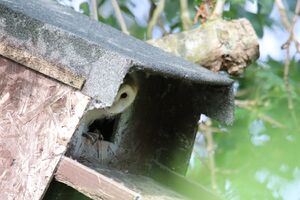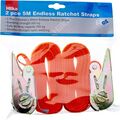Category: Barn Owls: Difference between revisions
From Cookipedia
No edit summary |
No edit summary |
||
| Line 6: | Line 6: | ||
}} | }} | ||
<!-- /seo --> | <!-- /seo --> | ||
[[Image:Shy Barn Owl in our owl box.jpg|300px|thumb|right|Baby barn owl plying peek-a-boo in our [[owl box]]]] | [[Image:Shy Barn Owl in our owl box.jpg|300px|thumb|right|Baby barn owl plying peek-a-boo in our [[owl box]]]] | ||
Latest revision as of 14:37, 27 February 2023

All about Barn Owls
Key Facts about Barn Owls (Tyto alba)
- What they eat
- Mice, voles, shrews and some larger mammals and small birds
- Size
- Length: 33-39cm
- Wingspan: 80-95cm
- Weight: 250-350g
- Population
- UK breeding: 4,000-14,000 pairs
- Europe: 110-220,000 pairs
What a Barn Owl Sounds Like
The audio clip below is one owl in the box squawking and another owl flying up to the box and then circling, screeching. The clonk is the first owl landing on the perch on the box.
Barn Owl Breeding Facts
- Nesting period
- March to August
- Nest material
- Owl pellets (poo)
- Nest site
- Natural and man-made cavities, such as trees, cliffs, barns, buildings and nest boxes
- Number of eggs
- 4 to 6
- Number of broods (sets of young bird siblings, hatched at the same time by the same parents
- 2
- Incubation period
- 29 – 34 days - female sits on the eggs
- Fledgling period
- 50 - 55 days after hatching
Pages in category ‘Barn Owls’
The following 3 pages are in this category, out of 3 total.
Media in category ‘Barn Owls’
The following 16 files are in this category, out of 16 total.
-
Barn Owl Box61.jpg 900 × 817; 628 KB
-
Barn Owl Box62.jpg 821 × 817; 540 KB
-
Barn Owl Box64.jpg 900 × 600; 617 KB
-
Barn Owl Box67.jpg 826 × 817; 819 KB
-
Barn Owl Box68.jpg 900 × 640; 578 KB
-
Little Owl Box and squirrel.jpg 900 × 900; 664 KB
-
OurBungalowUpwellNorfolk.jpg 2,179 × 1,324; 875 KB
-
Plan for building a barn owl tree nesting box.jpg 1,662 × 1,174; 264 KB
-
Pulley Shackle block and tackle.jpg 899 × 899; 175 KB
-
Ratchet straps.jpg 900 × 899; 686 KB
-
Shuttering around our owl box tree close-up.jpg 600 × 900; 488 KB
-
Shy Barn Owl in our owl box.jpg 900 × 600; 530 KB
-
Upwell Barn Owl Box with owl landing.jpg 900 × 601; 439 KB
-
Very Simple Easy To Build Owl Box.jpg 1,062 × 1,000; 93 KB
-
White scat from barn owls.jpg 900 × 600; 638 KB
-
Why our owl box needed protection.jpg 900 × 600; 380 KB















